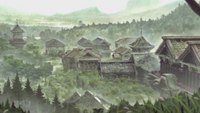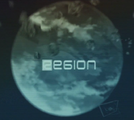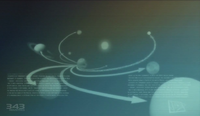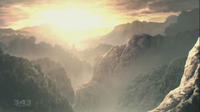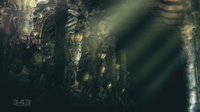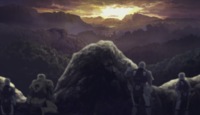Heian: Difference between revisions
From Halopedia, the Halo wiki
(→Trivia) |
mNo edit summary |
||
| Line 35: | Line 35: | ||
==Trivia== | ==Trivia== | ||
*The planet is likely named after either the [[Wikipedia:Heian period|Heian period]] of Japanese history, or [[Wikipedia:Heian-kyō|the city]] from which the period takes its name. | *The planet is likely named after either the [[Wikipedia:Heian period|Heian period]] of Japanese history, or [[Wikipedia:Heian-kyō|the city]] from which the period takes its name. | ||
*The fact that the ruins on the planet were relatively intact suggested that either the planet was missed when the Forerunners purged the galaxy of any trace of | *The fact that the ruins on the planet were relatively intact suggested that either the planet was missed when the Forerunners purged the galaxy of any trace of the prehistoric human civilization or that the planet was abandoned during one of humanity's technological dark ages long before their war with the Forerunners. | ||
==Gallery== | ==Gallery== | ||
Revision as of 13:31, December 4, 2014
Heian[1][2] is a world in an unknown system in the Milky Way Galaxy. The planet is terrestrial, with a breathable atmosphere and an Earth-like surface. Meteor showers are common on this world, as thousands of asteroids orbit the planet.[3]
History
During the Human-Covenant War, the world was the site of an important Covenant logistics base, from which supplies were delivered to the rest of the planets in the system, as well as the entire sector. The UNSC deployed a team of Orbital Drop Shock Troopers and a SPARTAN on the planet, with the mission to assassinate the Prophet in charge of the operations within the system, in order to stop the Covenant supply chain. They were also tasked with gathering intelligence on the unknown ruins. The team succeeded in their mission, but the Spartan was lost in combat against a Hammer-wielding Brute and an ODST, Checkman, was killed after striking an asteroid in orbit and burned up in the atmosphere after losing control of his SOEIV.[3] The photographs taken by the team were later studied by the Department of Xenoarchaeological Studies at the University of Edinburgh along with the University of Calcutta as a part of an extensive investigation of Forerunner relics.[1]
Ruins
It is likely that these ruins were left by prehistoric human civilization that was known to exist during the time of the Forerunners. Their architecture appears to be a mix of a variety of ancient human styles, including Greco-Roman, Middle Eastern and East Asian, with subtle Forerunner themes.[1] East Asian themes are clearly among the most prevalent in the structures, including decorations containing dragon-like creatures and statuaries distinctively similar to statues of Buddha.
Most of the buildings have pagoda-like roof structures. Overall, the designs are very ornate and full of carvings. Curiously, the overall scale of most structures is massive; one step in a staircase may be the height of an average human. Some structures seem like a mix of ancient and relatively modern industrial architecture, including a water processing facility with aqueducts and valve systems nigh-identical to those used by humans.[3]
The ruins also sparked interest within the scientific community. The Department of Xenoarchaeological Studies at the University of Edinburgh, when analyzing the photographs taken by the ODST team from the ruins on Heian, found the obvious elements of human architecture in the structures puzzling, wondering if their builders borrowed from human architecture or the other way around.[1]
Trivia
- The planet is likely named after either the Heian period of Japanese history, or the city from which the period takes its name.
- The fact that the ruins on the planet were relatively intact suggested that either the planet was missed when the Forerunners purged the galaxy of any trace of the prehistoric human civilization or that the planet was abandoned during one of humanity's technological dark ages long before their war with the Forerunners.
Gallery
List of appearances
- Halo: Evolutions - Essential Tales of the Halo Universe
- From the Office of Dr. William Arthur Iqbal (Mentioned only)
- Halo Legends
- The Babysitter (First appearance)
